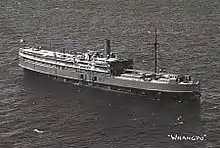 SS Whang Pu in civilian service | |
| History | |
|---|---|
| Owner | |
| Operator |
|
| Port of registry | |
| Builder | Taikoo Dockyard & Engineering Co, Hong Kong |
| Launched | 1920 |
| Acquired | 31 December 1941 |
| Commissioned | 1 October 1943 |
| Decommissioned | 22 April 1946 |
| Fate | Sold to shipbreakers 1949 |
| General characteristics | |
| Type | Passenger & cargo liner |
| Displacement | 3204 GRT |
| Length | 320 ft (98 m)[1] |
| Beam | 46.5 ft (14.2 m)[1] |
| Draught | 22.3 ft (6.8 m)[1] |
| Propulsion | Triple-expansion steam reciprocating engines driving twin screws |
| Speed | 10 knots (19 km/h) |
HMAS Whang Pu (FY-03) or SS Wang Phu was a 3,204 ton riverboat[2] of the China Navigation Company that was commissioned into the Royal Australian Navy (RAN) in the Second World War. Her Chinese name translates to "Happy Times".[3] She was one of a group of vessels called the "China Fleet" requisitioned for the RAN in similar circumstances.
Pre-war service
The Taikoo Dockyard and Engineering Company, Hong Kong built Wang Phu in 1920 for the China Navigation Company.[4] Both Taikoo Dockyard and CNC were owned by John Swire and Sons Ltd, which is British-owned but based in Hong Kong.[5]
War service
The Admiralty requisitioned Whang Pu on 31 December 1941 and work started at Singapore to convert her into a submarine depot ship for the Royal Navy.[3] However, this coincided with the Japanese invasion of Malaya and in January 1942 work on Wang Phu was stopped. She sailed to Fremantle, Western Australia where she served as a depot ship for Royal Netherlands Navy submarine and minesweeper crews.
She was commissioned into the Royal Australian Navy on 1 October 1943 as HMAS Whang Pu and fitted out in Melbourne as a mobile repair ship. She served in New Guinea waters and later at Morotai in the Dutch East Indies as a stores ship. After the war she sailed to Hong Kong where she was paid off on 22 April 1946 and returned to her owners.
Post-war
She was then used as an accommodation ship, and in November 1949 was sold for breaking up.[3]
See also
Notes

- 1 2 3 "Lloyd's Register, Steamships and Motor Ships" (PDF). Lloyd's Register. 1937–38. Retrieved 9 September 2011.
- ↑ Harnack, Edwin P (1938) [1903]. All About Ships & Shipping (7th ed.). London: Faber and Faber. p. 444.
- 1 2 3 "HMAS Whang Pu". Allied Chinese Ships WWII. Allied Chinese Ships Association. Archived from the original on 28 October 2003. Retrieved 9 September 2011.
- ↑ Swiggum, S; Kohli, M (28 July 2010). "China Navigation Company". The Ships List. Archived from the original on 2 October 2011. Retrieved 9 September 2011.
- ↑ The archives of John Swire & Sons Ltd (including the papers of the Taikoo Dockyard and the China Navigation Company Ltd) are held at the School of Oriental and African Studies, London, http://www.soas.ac.uk/library/archives/